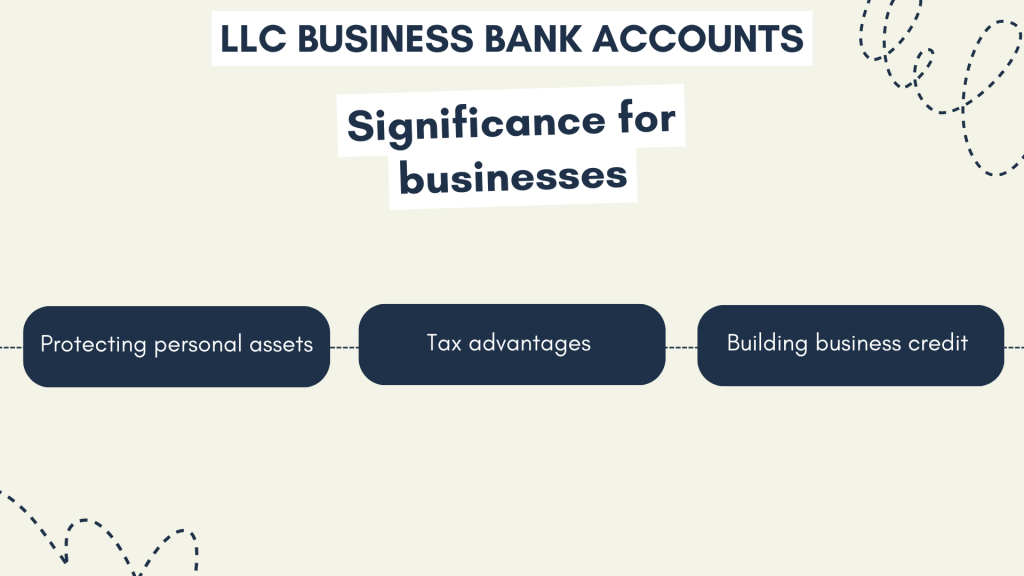Today, businesses take on a multitude of forms, each tailored to the unique needs and ambitions of their founders. One such form is the Limited Liability Company (LLC), a legal structure that offers a compelling blend of flexibility and asset protection. At the heart of managing finances for an LLC lies the business bank account, specifically, the LLC business checking account.
In this guide, we’ll journey through the peculiarities of LLCs and dissect the significance of business bank accounts within this structure. Along the way, we’ll explore the types of LLC bank accounts, delve into the process of opening a business checking account for your LLC, and navigate the complexities of managing your LLC business bank account.
Disclaimer
The information provided in this article is intended for general informational purposes only. It does not constitute legal, financial, or professional advice. It’s recommended to consult with qualified legal and financial professionals to address your specific LLC and business banking needs. Laws and regulations may vary by jurisdiction, and individual circumstances can significantly impact your unique situation. This article serves as a general guide to business bank accounts for LLCs and is not a substitute for tailored advice from qualified experts.
What is LLC?
Before getting to the peculiarities of LLC business checking accounts, you might want to go through definitions to clearly understand what we’re going to talk about. So, let’s recall what LLC is.
LLCs (Limited Liability Companies) have become the preferred choice for many entrepreneurs and small business owners. This structure blends the liability protection of a corporation with the simplicity and flexibility of a partnership or sole proprietorship. One of the primary reasons individuals opt for an LLC is to safeguard personal assets from business liabilities. In the eyes of the law, an LLC is a separate legal entity, which means that your personal assets like your home and savings account are typically shielded from business debts and legal claims. This protection is fundamental in ensuring your peace of mind as you navigate the turbulent waters of the business world.
In addition to liability protection, LLCs offer a more straightforward approach to taxation compared to corporations. Profits and losses from the business “pass through” to the owners’ personal tax returns, which can simplify tax reporting and reduce the administrative burden. Moreover, LLCs enjoy flexibility in management, allowing owners to decide how they want to structure the company. Whether you’re a single-member LLC or part of a multi-member setup, you have the freedom to choose the management style that suits your business’s needs.
What is a business checking account?
Now that we’ve grasped the essence of LLCs, let’s delve into the cornerstone of financial management for these entities – the business checking account. At its core, a business checking account is a specialized bank account designed exclusively for business purposes. It serves as the central hub for your company’s financial transactions, enabling you to receive payments, pay bills, and monitor your cash flow with ease.
Unlike personal checking accounts, business checking accounts are tailored to accommodate the specific needs of a company. They offer various features, such as the ability to accept multiple payment types, including checks and credit card payments. These accounts also allow for greater transaction volumes, making them ideal for businesses with a higher number of financial interactions. Moreover, business checking accounts provide essential tools to manage and track business expenses, simplifying tax reporting and financial analysis.
Beyond these fundamental functions, business checking accounts play a crucial role in separating your personal and business finances. This separation is not merely a convenience; it’s a legal and financial necessity, particularly for LLCs. Keeping your personal and business finances distinct is vital to preserving the limited liability status of your LLC. It prevents commingling of funds, which can jeopardize your personal assets if legal issues arise.
Read about chacking accounts in more details in our article Checking Account as a Type of Bank Account: Understanding the Nature of Checking Accounts
The significance of business bank accounts for LLCs
Now that we comprehend LLCs and business checking accounts, let’s explore why combining these two entities benefits business owners.

Protecting personal assets
As an LLC owner, you’re drawn to the structure’s promise of limited liability – the assurance that your personal assets remain untouchable in the event of business debts or legal disputes. However, to uphold this protection, you must rigorously maintain the separation between your personal finances and those of the LLC. This separation is enforced through a series of legal formalities, and one of the most crucial is having a dedicated business bank account.
Imagine your LLC as a fortress, shielding your personal assets from harm. The business checking account acts as the moat, the last line of defense. It’s the final barrier that prevents business creditors from laying siege to your personal wealth. Without this separation, your LLC could be deemed a mere extension of yourself, eroding the protective walls that the structure was designed to provide.
Tax advantages of separating personal and business finances
In the world of taxes, the mingling of personal and business finances can lead to confusion and complications. Tax authorities expect clear, well-defined boundaries between your personal income and your business earnings and expenses. Failure to maintain this separation can trigger audits and potentially hefty penalties.
A well-maintained business checking account simplifies tax compliance by providing a clean record of all your business-related transactions. This recordkeeping not only makes it easier to report income and expenses but also ensures you maximize deductions and credits available to your LLC. It’s an essential tool for keeping your tax obligations in check and minimizing your overall tax liability.
Building business credit with a checking account
Beyond safeguarding your personal assets and simplifying taxes, a business checking account can be a valuable tool for building your LLC’s credit profile. A strong credit history can open doors to financing opportunities, better terms on loans, and improved vendor relationships.
A well-managed business checking account demonstrates financial responsibility to creditors and lenders. Timely payments, responsible fund management, and a positive cash flow are indicators of a healthy business. Over time, this can translate into a favorable credit score for your LLC, making it more attractive to banks and investors.
Moreover, by keeping your business finances separate, you can clearly establish your LLC’s financial track record. This separation prevents personal financial missteps from affecting your business creditworthiness. It’s a strategic move that can pave the way for your LLC’s future growth and financial stability.
Types of LLC bank accounts
Now that we appreciate the integral role of business checking accounts for LLCs, let’s explore the diverse options available. LLC bank accounts are not one-size-fits-all; they come in various forms, each tailored to meet specific business needs.
Business savings accounts – a companion to business checking
While business checking accounts are the workhorses of day-to-day financial management, business savings accounts are their prudent companions, offering opportunities for your LLC to grow its cash reserves. These accounts typically yield interest on your deposited funds, albeit at lower rates compared to personal savings accounts. Nonetheless, the interest accrual can contribute to your LLC’s financial stability over time.
Business savings accounts are ideal for stashing away surplus funds, building an emergency fund, or saving for future investments or expenses. They provide a secure repository for your LLC’s cash surplus, allowing you to earn a modest return on your idle funds while keeping them readily accessible when needed.
Specialized LLC accounts for unique needs
The banking landscape is diverse, and so are the needs of different businesses, including LLCs. Depending on your industry and operations, you might find specialized LLC bank accounts tailored to your specific needs. These specialized accounts often come with features designed to streamline industry-specific processes or provide unique benefits.
For example, if your LLC operates in e-commerce, you might explore accounts that offer integrated payment processing solutions or seamless integration with online marketplaces. On the other hand, if your business involves international transactions, a business checking account with favorable foreign exchange rates and international wire transfer capabilities could be crucial.
Moreover, some banks offer accounts designed for specific business types, such as non-profits or real estate investment LLCs. These accounts may come with features like waived fees for certain transactions or tailored reporting options.
Online banking vs. traditional brick-and-mortar services
The digital revolution has transformed banking, offering LLCs a choice between traditional brick-and-mortar banks and online banking services. Each option has its advantages and drawbacks, and the decision hinges on your LLC’s preferences and operational needs.
Traditional brick-and-mortar banks provide the familiarity of in-person interactions and a physical branch network. This can be beneficial if your LLC relies heavily on cash transactions or if you prefer face-to-face assistance for complex banking needs. Additionally, these banks often offer a broader range of financial products and services, which can be advantageous if your LLC anticipates diverse financial requirements.
On the other hand, online banking services cater to the digital age, providing convenient access to your business checking account from anywhere with an internet connection. Online banks typically have lower fees and may offer more competitive interest rates. Moreover, they often integrate seamlessly with accounting software and other online tools, streamlining financial management for your LLC. However, if your LLC values in-person interactions or requires services like safe deposit boxes, you may find traditional banks more suitable.
Choosing between online and traditional banking hinges on your LLC’s unique needs, location, and preference for digital or physical interactions.
Opening an account: a business checking for your LLC
Now that you’re acquainted with the types of LLC bank accounts at your disposal, let’s embark on the journey of opening a business checking account tailored to your LLC.
What it takes to open an LLC bank account
Opening an LLC business checking account is a methodical process that requires attention to detail and careful preparation. The specific steps may vary slightly from one bank to another, but the core process remains relatively consistent. Here’s a step-by-step guide to help you navigate this essential task:
- Choose the right bank
Start by researching and selecting a bank that aligns with your LLC’s needs. Consider factors like fees, account features, accessibility, and any specialized services that cater to your industry. - Gather required documentation
Banks have stringent Know Your Customer (KYC) and Anti-Money Laundering (AML) regulations to adhere to. Be prepared to provide essential documents such as your LLC’s articles of organization, Employer Identification Number (EIN), and personal identification (e.g., driver’s license or passport). Additionally, some banks may require a copy of your LLC operating agreement. - Visit the bank or apply online
Depending on your chosen bank, you can either visit a branch in person or apply online. Online applications are increasingly popular, offering convenience and speed. - Complete the application
Whether in person or online, you’ll need to complete the business checking account application. This involves providing your LLC’s legal name, address, EIN, and other relevant details. - Deposit funds
Most banks require an initial deposit to open the account. The minimum deposit varies, so be sure to check with your chosen bank. This initial deposit is the first step in funding your business checking account. - Review and sign the agreement
Carefully review the terms and conditions of the account agreement, including any associated fees and features. Once satisfied, sign the agreement to finalize the account opening. - Receive your account information
After successfully opening the account, the bank will provide you with account details, including the account number and routing number. These are essential for conducting transactions and setting up payments. - Order business checks and debit cards
You may wish to order business checks and debit cards with your LLC’s name for seamless business transactions. - Set up online banking
If available, set up online banking access to monitor your account, make online transfers, and utilize digital banking services. - Establish account management procedures
Develop clear account management procedures within your LLC, including guidelines for authorized signatories and transaction approvals. This ensures accountability and prevents unauthorized access to your account.
Documentation and information you might require
When opening your LLC business checking account, meticulous preparation is key. Here’s a breakdown of the necessary documentation and information you’ll need:
- LLC articles of organization
This document, filed with your state, establishes your LLC’s legal existence. It typically includes your LLC’s legal name, address, and the purpose of your business. - Employer Identification Number (EIN)
The EIN, also known as a Federal Tax Identification Number, is akin to a Social Security number for your LLC. It’s essential for tax purposes and identifies your business to federal agencies. - Personal identification
Banks require personal identification from all individuals authorized to access and manage the account. This may include driver’s licenses, passports, or other government-issued IDs. - LLC operating agreement
While not always required, some banks may request a copy of your LLC operating agreement, which outlines the ownership and management structure of your business. - Initial deposit
Be prepared to fund your business checking account with an initial deposit. The minimum deposit requirement varies by bank.
It’s always necessary to check with your chosen bank for specific documentation requirements, as they may have additional criteria or variations in their application process.
Managing your LLC bank account
With your LLC business checking account successfully opened, it’s time to delve into the day-to-day operations and best practices for managing your financial affairs.
Let’s break it down.
Navigating your day-to-day operations
Your business checking account serves as the financial epicenter of your LLC, handling a myriad of transactions daily. To make the most of this account, consider implementing the following practices:
- Regular reconciliation
Reconcile your account regularly to ensure that your records align with the bank’s statements. This process helps identify discrepancies, errors, or unauthorized transactions promptly. - Expense tracking
Use your business checking account for all business-related expenses. This simplifies recordkeeping and ensures that you capture all deductible expenses for tax purposes. - Regular deposits
Maintain a consistent schedule for depositing income into your account. This keeps your cash flow stable and ensures you have funds to cover expenses and payroll. - Budgeting
Establish a budget for your LLC and track your income and expenses against it. Budgeting helps you stay on top of your financial health and make informed decisions. - Online banking tools
Leverage the online banking tools provided by your bank to monitor your account, set up alerts for account activity, and automate recurring payments. - Authorization protocols
Implement clear authorization protocols for withdrawals and transfers. Specify who within your LLC has the authority to access and manage the account, and establish controls to prevent unauthorized access.
Keeping accurate records for tax purposes
Accurate recordkeeping is not just a good business practice; it’s essential for tax compliance. The IRS and state tax agencies require detailed records to support your LLC‘s income, deductions, and credits. Here are some key recordkeeping tips:
- Save receipts and invoices
Retain all receipts, invoices, and financial documents related to your LLC. These documents serve as evidence of expenses and income. - Categorize expenses
Categorize expenses to make it easier to report them accurately on your tax return. Common categories include office supplies, utilities, rent, and payroll. - Bank statements
Keep copies of your business checking account statements for at least seven years. These statements provide a historical record of your financial transactions. - Digital records
Consider using accounting software to digitize and organize your financial records. Many platforms offer features that streamline recordkeeping and generate reports for tax filing. - Consult a tax professional
It’s advisable to work with a tax professional or accountant experienced in LLC taxation. They can provide guidance on tax deductions, credits, and compliance, ensuring you maximize tax benefits while staying within legal bounds. - Scheduled record checks
Set aside time regularly, whether weekly, monthly, or quarterly, to review and update your financial records. This prevents a last-minute scramble during tax season.
By carefully maintaining financial records, you not only ease the tax-filing process but also gain valuable insights into your LLC’s financial health. At this point, automating bookkeeping with Synder might help you reach the impecable level of financial data accuracy to benefit from flawless reconciliation, facilitated tax reporting, and informative financial statements to base your decision-making on.
Interested? Book your free seat at Synder demo to learn more detail and have yor questions answered or sign up for a free trial to explore Synder your self and see whether it fits your business.
Overdraft protection and account monitoring
Financial stability is a cornerstone of business success, and maintaining a positive balance in your business checking account is paramount. However, unforeseen circumstances can lead to overdrafts or insufficient funds, potentially resulting in fees or declined payments.
To mitigate these risks, consider implementing overdraft protection, a service offered by many banks. Overdraft protection links another LLC bank account, such as a savings account, to your checking account. If your checking account balance falls below a certain threshold, funds are automatically transferred from the linked account to cover the shortfall. While this service may incur fees or interest, it provides a safety net to prevent disruptions to your LLC’s financial operations.
Consistent monitoring of your business checking account is also essential. Regularly reviewing your account activity allows you to spot any unusual or unauthorized transactions promptly. Many banks offer real-time alerts through their online banking platforms, notifying you of account activity via email or text message. Leveraging these alerts adds an extra layer of security to your account management.
In the dynamic world of business, financial vigilance is your best ally. By diligently monitoring your account and implementing safeguards like overdraft protection, you ensure that your LLC remains on solid financial footing.
Business banking services and tools
While business checking accounts are the central hub of financial operations for many LLCs, modern banking offers a wealth of additional services and tools to enhance your financial management capabilities. Let’s look at some of the banking products and services you might be offered in addition to your checking account.
Beyond checking: other services for LLCs
- Business savings accounts
As mentioned earlier, business savings accounts provide a secure place to park surplus funds, earn interest, and build financial reserves. - Business credit cards
A business credit card offers a convenient way to make purchases, manage expenses, and earn rewards or cashback on eligible transactions. It also helps establish your LLC’s credit history. - Merchant services
If your LLC engages in e-commerce or accepts card payments, consider utilizing merchant services provided by your bank. These services facilitate secure and efficient payment processing for your customers. - Lines of credit
A business line of credit offers a flexible source of funding for short-term financing needs, such as covering cash flow gaps or seizing growth opportunities. - Business loans
Banks offer various types of business loans, including term loans, SBA loans, and equipment financing. These loans can provide the capital necessary to expand your LLC or invest in new initiatives.
Business debit cards and credit lines
A business debit card is a practical tool for day-to-day financial operations. It allows you to make purchases, withdraw cash, and pay bills directly from your business checking account. It’s a convenient alternative to writing checks and provides a detailed record of transactions, simplifying expense tracking.
On the other hand, a business line of credit is a revolving credit facility offered by banks. It provides your LLC with access to a predetermined credit limit, which you can draw from as needed. Unlike a traditional loan, you only pay interest on the amount borrowed, making it a cost-effective solution for managing working capital fluctuations and unexpected expenses.
Both business debit cards and lines of credit offer financial flexibility and liquidity, allowing your LLC to navigate the ebb and flow of business operations.
Online apps and tools for efficient money management
The digital era has ushered in a wave of innovation in banking, empowering LLCs with online banking apps and tools that streamline money management.
Online banking apps enable you to access your business checking account from your smartphone or computer, providing real-time account balances, transaction history, and account activity alerts. They also offer the convenience of remote check deposits, fund transfers, and bill payments, saving you time and reducing the need for in-person visits to a bank branch.
Moreover, many banks provide integrated financial management tools that allow you to categorize expenses, create budgets, and generate financial reports. These tools offer insights into your LLC’s financial health and facilitate informed decision-making.
Besides, online banking apps often feature advanced security measures, such as multi-factor authentication and encryption, to safeguard your business checking account against cyber threats.
Merchant services and payment processing solutions
If your LLC engages in e-commerce or accepts card payments, merchant services and payment processing solutions are indispensable.
- Merchant services encompass a range of offerings that facilitate card payments, both in-person and online. These services include point-of-sale (POS) systems, card readers, and payment gateways. They ensure seamless and secure transactions, enhance the customer experience, and enable your LLC to accept various payment methods, including credit cards, debit cards, and mobile wallets.
- Payment processing solutions, on the other hand, enable your LLC to process electronic payments. These solutions integrate with your business checking account, allowing you to receive payments from customers, clients, or vendors electronically. They simplify the invoicing and payment collection process, reducing manual effort and improving cash flow.
Choosing the right business bank account
Now that we’ve explored the vast array of banking services and tools available to LLCs, the question arises: How do you choose the right business bank account that aligns with your LLC’s specific needs?
Factors to consider when choosing a bank to go with
As mentioned above, different banks might have different requirements and conditions for openning and running a checking account alonside with offering you various banking products and services. At this point, choosing the right account might turn complicated, especially if you’re not into banking peculiarities. So here’re some factors you might want to consider whan choosing a bank to go with.
- Fees and transaction costs
Evaluate the fees associated with the business checking account, including monthly maintenance fees, transaction fees, and ATM fees. Seek an account that offers transparent fee structures and, if possible, fee waivers based on balance or transaction volume. - Interest rates
While interest rates on business checking accounts are typically modest, they can vary among banks. Consider an account that offers a competitive rate, especially if your LLC maintains a significant balance. - Account features
Assess the features offered with the account. Look for mobile banking capabilities, online bill pay, overdraft protection, and integration with accounting software. These features enhance your LLC’s financial management. - Accessibility
Evaluate the bank’s branch and ATM network, especially if your LLC conducts a significant amount of cash transactions. Choose a bank with convenient access to physical locations or in-network ATMs. - Customer service
Exceptional customer service is vital. Consider the bank’s reputation for responsiveness, availability of customer support channels, and the ease of resolving issues. - Specialized services
If your LLC operates in a specific industry or has unique financial needs, explore banks that offer specialized services tailored to your business type. - Digital banking tools
Emphasize the availability and functionality of online banking apps and tools. A user-friendly and feature-rich digital banking platform can significantly enhance your LLC’s financial management efficiency. - Credit and loan services
Assess the bank’s offerings in terms of business credit cards, lines of credit, and business loans. These services can be valuable for your LLC’s growth and financial stability. - Merchant services
If your LLC engages in e-commerce or card transactions, investigate the bank’s merchant services and payment processing solutions to ensure they meet your business needs. - Reputation and stability
Research the bank’s reputation, financial stability, and track record. You want a banking partner you can trust for the long term.
Choosing the right business checking account might be a pivotal decision for your LLC. It’s not just about where you store your money; it’s about the financial tools and support that will enable your LLC to thrive.
Regulatory and compliance issues you might face
While the world of banking offers a plethora of opportunities and benefits for LLCs, it also comes with a set of regulatory and compliance obligations. Navigating these issues is crucial to ensure that your LLC operates within the bounds of the law.
Legal considerations: complying with regulations when managing your LLC business account
- Know Your Customer (KYC) requirements
Banks are mandated to implement strict KYC procedures to verify the identities of their customers. Be prepared to provide personal identification and LLC documentation during the account opening process. - Anti-Money Laundering (AML) compliance
LLCs must adhere to AML regulations aimed at preventing money laundering and other financial crimes. Stay vigilant about monitoring account activity and reporting suspicious transactions. - Tax reporting
Accurate tax reporting is paramount. Keep detailed records of your LLC’s income and expenses, and file taxes in compliance with federal, state, and local tax laws. - Bank Secrecy Act (BSA) requirements
The BSA requires banks to report certain transactions exceeding a specified threshold. Be aware of these requirements and ensure your LLC complies. - State and Federal regulations
Your LLC may be subject to state-specific banking regulations in addition to federal laws. Familiarize yourself with these regulations to avoid legal complications. - Licensing and permits
Depending on your industry and location, your LLC may require specific licenses and permits to operate legally. Ensure you have all necessary documentation in place. - Employment taxes
If your LLC has employees, you must withhold and pay employment taxes. Adhering to payroll tax regulations is essential to avoid penalties. - Contractual obligations
Be aware of any contractual agreements with banks or financial institutions. These agreements may impose certain obligations or restrictions on your LLC.
Compliance with regulatory and legal requirements is non-negotiable for LLCs. Ignoring or neglecting these obligations can lead to fines, legal troubles, or the loss of your limited liability protection.
Closing your LLC account
While opening a business checking account is a crucial step in your LLC’s financial journey, there may come a time when it’s necessary to close the account. Whether you’re closing due to business closure, a change in banking needs, or other reasons, it’s essential to do so properly.
Closing your LLC business checking account is a systematic process that requires attention to detail. Here’s a step-by-step guide to help you close the account:
- Review account activity
Before closing the account, review the recent account activity to ensure all outstanding transactions are accounted for. Make sure there are no pending deposits or withdrawals. - Cancel automatic payments
If your LLC has any automatic payments or withdrawals linked to the account, be sure to cancel them to prevent any unexpected transactions after closure. - Notify vendors and clients
Inform vendors, clients, or anyone who regularly sends payments to your LLC of the impending account closure. Provide them with the updated banking information if necessary. - Transfer funds
Transfer any remaining funds from the business checking account to your new account or to your business savings account if applicable. - Contact your bank
Reach out to your bank’s customer service or visit a branch to initiate the account closure process. Be prepared to provide account information, identification, and your reason for closing the account. - Obtain written confirmation
Request written confirmation of the account closure from the bank. This document serves as proof that you’ve officially closed the account. - Update your records
Update your LLC’s financial records to reflect the closed account. Ensure your accounting and tax records accurately reflect the change. - Maintain records
Keep records of the account closure confirmation, especially if there are any disputes or issues that arise later.
Properly closing your LLC business checking account ensures a smooth transition to a new banking arrangement or closure of your business. It also helps maintain your financial integrity and reduces the risk of unauthorized transactions.
Conclusion
To wrap it up,
the choice of a business bank account for your LLC is paramount. It shapes the financial foundation of your enterprise and safeguards your personal assets with the allure of limited liability. Your business checking account becomes the linchpin of your financial strategy, guarding your assets and warding off liabilities.
Remember, this choice is an ongoing commitment to financial prudence, accountability, and compliance. It’s an alliance with a banking partner that shares your vision and supports your LLC’s aspirations. So, choose wisely, manage diligently, and navigate financial regulations with care to secure your LLC’s financial future.
Read more about TIE ratio, Asset turnover ratio or What is a proforma invoice.






